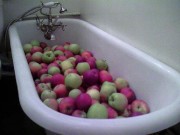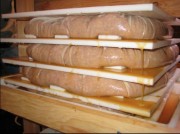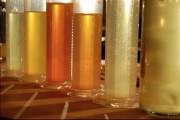
On April 5, Mike Cadoux of Peak Organic Brewing Company sat in with the gang on Beer Sessions Radio (TM) to talk about organic beer. Mike sat down to answer a few questions before the show:
What are the challenges in making an organic beer that may be different from a beer not labeled organic?
The main difficulty with brewing organic beer compared with “regular” beer is just the sourcing of ingredients. Obviously, we have to be more careful where they come from and can’t spot buy them off the market as much. This has become a positive for us, however, because it has led to many personal relationships with farmers.
After a long battle, organic hop growers have finally won their fight to require beers labeled organic to be brewed with organic hops (For more information on this issue, click here.) Will the upcoming, new organic hop regulations have an effect on Peak Organic?
We planned far in advance for the new hop regulations and now have some of the most amazing hop varietals being grown for us organically, including Amarillo, Cascade, Centennial, Summit, Simcoe, Citra, and more. We went to the source, in the Yakima, and forged great relationships with the farmers themselves.
In what ways can the beer industry at large improve on issues of sustainability?
This is a question with many answers, and many of them not specific to the beer industry. More renewable energy, more responsible farming, etc. Comparatively, brewers are actually pretty good at this, and aware.
Can you explain Peak’s relationship with Chef’s Collaborative?
Chef’s collaborative is a group that promises to use local and sustainable ingredients in their restaurants, so we have a natural synergy with them as far as mission goes. Then we make a beer with them, the Maple Oat Ale, that uses organic Maine oats and organic Vermont maple syrup.
Are there any upcoming events/ releases/ other news about Peak Organic that you would like our listeners to know about?
We just finished our last Single Hopped Seasonal – our Simcoe Spring Ale. Each of our seasonals is a showcase for a specific hop variety – that we created to make sure all the more badass hops had a definite demand. Our Summer Session will follow and is hopped with Amarillo, Fall Summit with Summit and Winter Session with Citra. I’ll have some Simcoe Spring to try out on everybody, its killer.
Thanks, Mike! Click here to learn more about Peak Organic Brewing Company.



